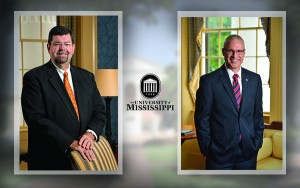OXFORD, Miss. – Acting Chancellor Morris Stocks and Acting Provost Noel Wilkin were recently thrust into short-term roles at the University of Mississippi, but they have a comprehensive vision for UM that includes continued enrollment growth, new financial contributions and a focus on faculty recruitment.
Stocks was UM’s provost when he was recently chosen by the Mississippi Institutions of Higher Learning to be acting chancellor to replace outgoing Chancellor Dan Jones. Wilkin was serving as associate provost and professor of pharmacy administration and research professor in the Research Institute of Pharmaceutical Sciences when he was named acting provost.
The UM Board Search Committee is looking for a new UM chancellor and expects to have one in place by early 2016. Stocks said the university will prosper during the six-to-eight-month interim period because its staff is strong and capable.
“I believe that our foundation for success is tremendously strong and I will, during my time of leadership, consistently remind our university of that,” Stocks said. “My extended and varied experience at the University of Mississippi, together with the good relationship I share with both the university’s leadership team and our IHL board, will keep us moving forward over the next several months.”
Stocks and Wilkin want to maintain momentum in enrollment, find new financial gifts from alumni and friends of the university, recruit in support of top faculty and staff, and secure research funds. They also want to continue to focus on athletics success, as well as the timely completion of buildings and other infrastructure to support the university’s growth.
“Each area contributes enormously to our reputation as one of our country’s leading universities, and I’m focused on making sure we’re delivering at the highest level in each area,” Stocks said.
In his 25-year career at UM, Stocks has been a full-time faculty member, associate provost, dean of the Patterson School of Accountancy, senior vice chancellor for planning and operations and UM provost. He holds a bachelor’s degree in accounting from Trevecca Nazarene University, a master’s degree in accounting from Middle Tennessee State University and a Ph.D. in accounting from the University of South Carolina.
When asked whether he would seek the chancellor’s job full-time, Stocks said he would like the opportunity to serve UM.
“Should our governing board ask me to serve as chancellor, I would consider it a high honor and would commit myself to moving this university forward on the very positive track we’ve enjoyed in recent years,” Stocks said. “If our board determines that there are more qualified candidates for the chancellor position, I will be just as committed to our university in whatever role I can be most helpful. I love the University of Mississippi and I say that without reservation. I am in my 25th year of service here, and I fully believe in our mission.”
The Oxford campus continues to come to terms with the departure of Jones, who is returning to the UM Medical Center to head up obesity research efforts. Stocks said he believes he can continue the university on a forward path in the wake of Jones’ departure. He calls Jones “a great leader and wonderful friend” who is excited about his new role with UMMC.
He also believes Jones would remind the UM community that Ole Miss is trending upward due to hard work by many people over the last several years. Most of those faculty and staff members and administrators are still working here, Stocks noted.
Stocks said Wilkin also plays an important role in the transition process, and he has the utmost faith in Wilkin’s abilities.
Wilkin, who has worked at UM since 1996, holds a bachelor’s degree in pharmacy and a Ph.D. in pharmacy administration, both from the University of Maryland. Wilkin noted that neither he nor Stocks chose to be acting chancellor and provost, but the situation shouldn’t be the focus of the university’s leadership team moving forward.
“It does not advance the important work we do by focusing on how we got here,” Wilkin said. “Instead, I hope every person on our campus will think about how they can use their skills and talents to achieve a new level of success.”
The transition period over the next six to eight months requires a strong focus on the university’s momentum, Wilkin said. That means continuing a strong commitment to student success by supporting the university’s faculty and continuing to improve existing programs.
“I plan to strengthen our commitment to graduate education, research and creative achievement,” Wilkin said. “The University of Mississippi’s greatest strength is its talented faculty and staff; our goals and successes are determined by the work of these individuals. I intend to look for ways to set us on a path toward bolstering our creation of new knowledge and the visibility of creative achievement.”
Wilkin said it would be a “disservice to the university” to try to carry out the duties of his former job while being acting provost. He intends to hire an interim associate provost to help ease the transition. Until one is on board, everyone in his office has increased their efforts and others have also stepped up to help out, he said.
Losing the university’s momentum is always a risk during an interim leadership period, but Wilkin notes there’s another reason for the sense of urgency he and Stocks share. Success during the transition makes the university attractive to a potential chancellor, and the university deserves the best candidate available, Wilkin said.
“No one wants to jump on a ship that isn’t sailing anywhere or one that is merely coasting along the shore,” Wilkin said. “Each person can play a role in attracting a new leader by doing the things that they do best and by looking for ways to make us an even better university.”
